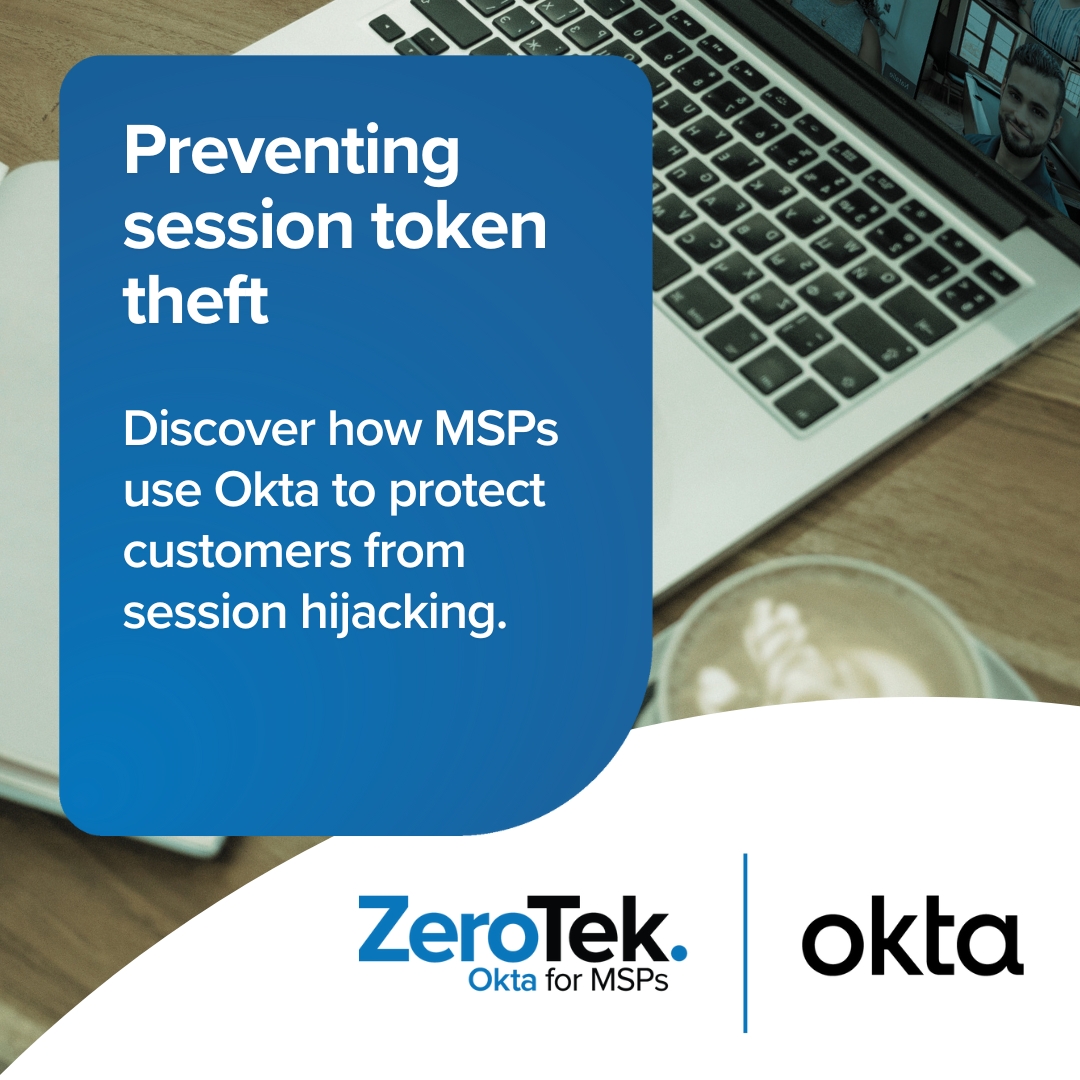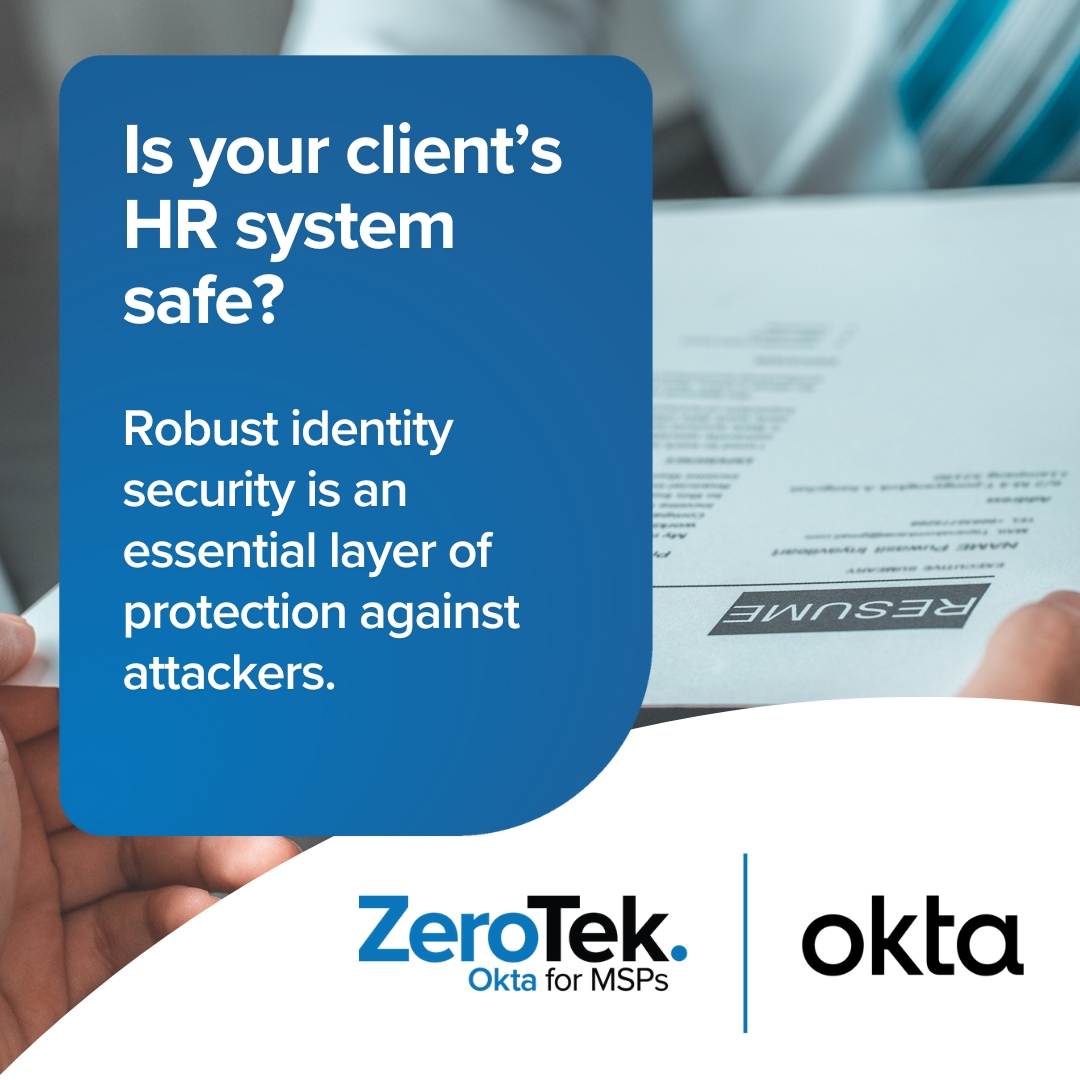Key Takeaways
- ZeroTek makes it easy for MSPs to upgrade to Okta and deliver Okta’s enterprise-class identity and access management (IAM) technology to their SMB customers.
- Okta lets MSPs deploy and scale faster and more reliably than Entra ID or on-premises identity directories.
- Okta closes security gaps Microsoft leaves open and, as a cloud-first, vendor-neutral platform, empowers MSPs to evolve continually.
Sections
- What’s the best IAM solution for MSPs?
- Microsoft seems like a no-brainer until needs evolve
- Okta’s cloud-first, vendor-neutral platform produces significantly faster and more reliable deployments
- Imagine rapid, reliable user provisioning and deprovisioning – across applications and customers
- MSPs want to deliver the best tools for their customers, not the best tools for Microsoft
- Okta closes security gaps Microsoft leaves open
- Okta makes it easier for MSPs to configure context-appropriate security
- Okta makes it easy to delight your customers
- MSPs need cost transparency and MSP-friendly licensing
- ZeroTek: Okta’s MSP Partner
- Okta and ZeroTek … and Microsoft?
- ZeroTek can help
- Comparison table
Sections
- What’s the best IAM solution for MSPs?
- Microsoft seems like a no-brainer until needs evolve
- Okta’s cloud-first, vendor-neutral platform produces significantly faster and more reliable deployments
- Imagine rapid, reliable user provisioning and deprovisioning – across applications and customers
- MSPs want to deliver the best tools for their customers, not the best tools for Microsoft
- Okta closes security gaps Microsoft leaves open
- Okta makes it easier for MSPs to configure contextappropriate security
- Okta makes it easy to delight your customers
- MSPs need cost transparency and MSP-friendly licensing
- ZeroTek: Okta’s MSP Partner
- Okta and ZeroTek … and Microsoft?
- ZeroTek Can Help
- Comparison Table
Key Takeaways
- ZeroTek makes it easy for MSPs to upgrade to Okta and deliver Okta’s enterprise-class identity and access management (IAM) technology to their SMB customers.
- Okta lets MSPs deploy and scale faster and more reliably than Entra ID or on premises identity directories.
- Okta closes security gaps Microsoft leaves open and, as a cloud-first, vendor-neutral platform, empowers MSPs to evolve continually.
What’s the best IAM solution for MSPs?
How you’re managing identity and access could be stalling growth for you and your customers.
This article takes an MSP-centric look at the pros and cons of using Okta vs Microsoft Entra ID (formerly Azure AD) for identity and access management.
Microsoft seems like a no-brainer until needs evolve
It’s common for MSPs to start with Microsoft Entra ID and lean on Conditional Access to manage who has access to what and when. And why not? The technology is already there, and your techs already know Microsoft, right?
But soon the limitations of Conditional Access outweigh any convenience for MSPs who want to scale, increase scope and complexity, or standardize the tech stack across customers. MSPs have told us for years about:
- Entra ID’s poor compatibility with non-Microsoft apps.
- Significant challenges getting the security experience to work as expected—even with experienced techs and investment in higher Microsoft product tiers.
- The blood-pressure-raising difficulty in getting support from Microsoft—even with a paid support plan, and critical, service-affecting issues.
MSPs eliminate these problems for themselves and their customers by:
- Upgrading from Entra ID and Conditional Access to Okta, the world’s leading enterprise-class identity and access management (IAM) solution.
- Delivering Okta through ZeroTek, a SaaS platform and company purpose-built to bring the power of Okta to MSPs and their SMB customers.
Okta’s cloud-first, vendor-neutral platform produces significantly faster and more reliable deployments
For MSPs or MSP customers deeply integrated with Microsoft and with no other SaaS applications, Entra ID may be sufficient.
But introduce popular SaaS apps like Zoom, BambooHR, Slack, and Zendesk—or niche tools like Epic, Cerner, or Clio for security-sensitive industries like healthcare and law—and managing identities and access with Entra ID becomes more challenging.
When integrating apps with Entra ID, MSPs often need to build and maintain custom API connectors to achieve the desired functionality. This can result in significant deployment delays and opportunity costs.
In comparison, integrating, configuring, and deploying an app with secure single sign-on (SSO) through Okta typically takes MSPs less than an hour. As a vendor-neutral platform built for the cloud, Okta accelerates deployment and adoption, offering 7800+ pre-built connectors for the apps you and your customers use daily.
Imagine rapid, reliable user provisioning and deprovisioning – across applications and customer
Even better, Okta’s Lifecycle Management (LCM) makes it straightforward to automate rapid user provisioning and deprovisioning for 700+ of those easily integrated apps, including Microsoft Office 365 (M365), Entra ID, SharePoint, and Intune. Leveraging Okta’s LCM means you can onboard users with secure access to all the apps they need in minutes and instantly cut off all access when it’s time to offboard.
Okta’s vendor-neutral commitment means MSPs can use Okta to secure a growing range of systems and tools, including:
- Google Workspace
- Virtual Desktop Infrastructure (VDI) environments such as VMWare Horizon
- VPN solutions
- On-prem Active Directory
- Mac devices
— all using a single Okta identity.
Gartner has recognized the strengths of Okta’s cloud-first, vendor-neutral platform in naming Okta as an IAM leader for seven years in a row; and for the last three years ranking Okta highest for “ability to execute”. Forrester has reached similar conclusions.
MSPs want to deliver the best tools for their customers, not the best tools for Microsoft
Okta’s vendor-neutral approach means MSPs can architect, deliver, and continually evolve a top-tier security service using the leading third-party tools that are best for their customers, not just the tools that work best with Microsoft.
Security-conscious MSPs can integrate Okta with things like:
- Unified endpoint management (UEM) and mobile device management (MDM) platforms as part of their device trust strategy.
- HR-as-a-Service (HRaaS) systems for seamless end-to-end identity management.
- Extended detection and response (XDR) tools like SentinelOne and CrowdStrike for extra layers of security. (Read more about how SentinelOne Singularity XDR can complement Okta’s contextual awareness and prevent malicious actors from advancing laterally across attack surfaces.)
When you use Okta, you and your customers are never locked in—you can retire, replace, and add apps anytime to meet changing needs and take advantage of new technological developments.
Okta closes security gaps Microsoft leaves open
Time is of the essence when there’s a security event. Okta’s instant enactment of policy changes means MSPs can grant or revoke access in a flash. Latency issues in Conditional Access create unacceptable security gaps, leaving your MSP admin team waiting up to 24 hours for policy changes to take effect.
Microsoft log update delays can also hobble your team’s troubleshooting efficiency. How can anyone fully understand and resolve a problem quickly without all the relevant information? Okta’s event logs update instantly and include a standard 90-day log retention to support thorough investigations when required; Entra ID retains only 30 days.
There are other security advantages with Okta. For example, at the pre-authentication stage, Okta ThreatInsight enhances Okta’s contextual access policies by automatically aggregating and analyzing data about sign-in activity across Okta’s global customer base. By detecting potentially malicious IP addresses and “informing” Okta policies about threat levels, Okta ThreatInsight can prevent credential-based attacks, including:
- Password spraying
- Credential stuffing
- Brute-force cryptographic attacks
Finally, MSPs need reliability. Okta exceeds its 99.99% uptime SLA annually, and Microsoft stands by its 99.998% SLA. While all security vendors have security incidents, Okta’s are demonstrably lower frequency, lower scope in terms of impacted systems, and lower impact/severity than Microsoft’s.
Okta makes it easier for MSPs to configure context-appropriate security
MSPs tell us how frustrating it is to keep up with all the admin portal changes and features moving around in Entra ID and Microsoft 365, often several times a year.
Okta’s policy engine is flexible and intuitive, making it easier for MSPs to configure context-appropriate security and authentication experiences for users. “Okta policies are much more granular and easier to configure than Microsoft Conditional Access, and then ZeroTek lets us automate and streamline deployment of those policies,” says Dan Le, CEO of Red Cup IT, an MSP and ZeroTek partner. “So that’s a big reduction in administrative overhead.”
To give MSP admins and technicians a greater boost, the Okta-certified experts at ZeroTek have developed and documented MSP-specific best practices for configuring Okta policies and security settings based on extensive testing, collaboration with MSP partners, and years of working closely with Okta’s research and development team.
Okta makes it easy to delight your customers
Okta’s attention to the finer details of the user experience means MSPs can deliver the low-friction, high-assurance access to apps that their customers demand. You can configure Okta to:
- Use any authentication factor from any vendor for any user or group of users—or, just as easily, standardize on the best authenticators.
- Use a number challenge with push notification only for high-risk sign-on.
- Protect customers from user enumeration attackers who try to identify user accounts and authentication enrolments.
- Detect lockouts caused by unknown devices, email end users about key security events occurring with their accounts, and allow end users to report suspicious activity to your support desk.
While Microsoft offers limited customized branding for the user experience, Okta allows you to create a custom vanity URL and customize brand colors, images, and terminology, as well as the user sign-in page, dashboard, and all emails.
MSPs need cost transparency and MSP-friendly licensing
For many MSPs, Microsoft appears to be less expensive than Okta. But the price advantage vanishes when you factor in Microsoft’s hidden costs, which include required license upgrades, infrastructure, deployment, maintenance, integration time, and the ongoing burden of custom coding required to manage identity and access. (Read more at Redmond Channel Partner.)
Alternatively, MSPs who configure Okta as the secure identity provider (IdP) in front of Microsoft eliminate:
- Costs of all P1 and P2 licenses
- Server costs – through migrating customers from on-premises solutions
- Shared admin accounts – as well as their associated security risks and administrative overhead
ZeroTek: Okta’s MSP Partner
While MSPs are often attracted to Okta’s superior technology, Okta’s procurement process and technical support are tailored to meet the needs of enterprise customers. That’s why Okta routinely refers MSPs to ZeroTek.
As Okta’s distribution partner for MSPs, ZeroTek offers:
- MSP-exclusive month-to-month Okta licensing and consumption-based billing to support the scalability and cost control that MSPs and their SMB customers need.
- The ability to create new Okta Orgs from ZeroTek:
- In seconds
- Without any contract or sales process
- For customers of any size
… and manage them all from a secure single dashboard.
- MSP-centric technical support from Okta-certified experts.
- MSP-centric features like help desk caller verification and role-based access control for granular technician access management to customer Okta Orgs.
In these ways and more, ZeroTek makes it easy for MSPs to upgrade to Okta and deliver the benefits of this world-class, enterprise-level IAM technology to their SMB customers.
Okta and ZeroTek … and Microsoft?
Despite the many significant benefits for MSPs who use ZeroTek to deliver Okta, some MSPs will not be ready to give up Microsoft and Conditional Access just yet.
- Because Okta interoperates so well with Microsoft, MSPs don’t have to embrace Okta the way US federal agencies, FedEx, or Zoom have.
- As an interim step, MSPs can leverage Okta to create a unified identity platform that simplifies Microsoft provisioning, supports cloud app adoption, reduces reliance on on-prem software, and centralizes policy management. This combination also streamlines your IT operations by automating manual tasks and increasing efficiency.
ZeroTek can help
Microsoft Entra ID and Okta both offer compelling IAM solutions. Whether you’re considering Okta, or a combination of both Microsoft and Okta, we can help you understand how Okta delivered through ZeroTek can secure and streamline your digital identity management. Book a call with us to explore how the ZeroTek | Okta solution can help your business succeed.
| Feature | Okta for MSPs from ZeroTek | Microsoft |
| Scalability |
|
|
| Cost |
|
|
| Security |
|
|
Are you ready?
Ready to explore how ZeroTek | Okta can help your MSP deliver next-level security services to your customers?






